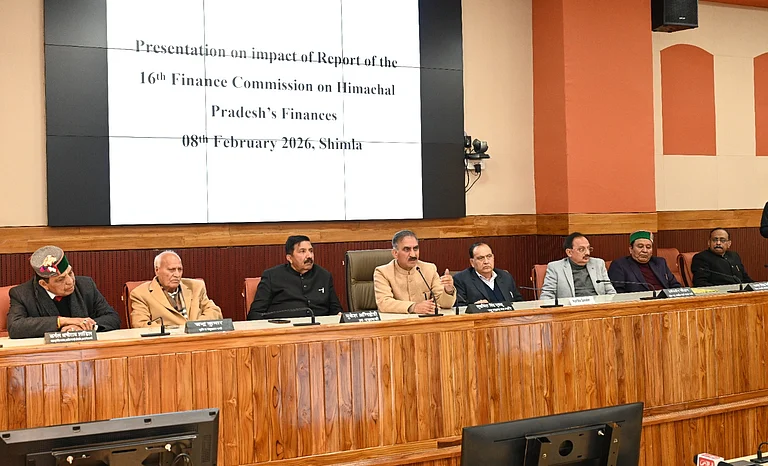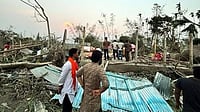Varavara Rao: A Life In Poetry
Edited by Meena Kandasamy and N Venugopal
Published by Penguin
Rs 499
Destroy those iron gates of the prison, the
demolish-stained stony altars
of chain worshipping!
O youthful Shiva,
Blow your horn of universal cataclysm!
Let the flag of destruction
rise amidst the rubble of prison walls
of the East!
— Kazi Nazrul Islam
Can a poet living in India now dare to write such lines above? The answer is obvious — no. But still, someone is singing on this night for the hope of the dawn. Yes, someone like Varavara Rao is a visionary who believes:
There is a stir beyond the mountainous barriers of caste.
See, the shades of blood harvest
Fragmented rays behind the hill.
Now, there is no place for fear.
Certainly, the dawn will come.
— Varavara Rao: A Life In Poetry
Rao’s newly-published collection of poetry ‘Varavara Rao: A Life In Poetry’, edited by N Venugopal and Meena Kandasamy, is not only the witness of at least 60 years of post-colonial India, but it’s also a book of hope amidst hate-ridden political narrative of present India. As a sensitive and non-conformist, his pen aches for farmers, for Dalits, for women, and for all who are the worst victims of capitalism and state oppression. He denies being a prop in the background. Rather, he decides to be a chronicler and the light in the right direction.
In present-day India when the deafening silence is so entrenched in the poetic community, Rao is quite erudite and obvious in his stand:
When crime seizes power
Hunts down people
Holds them criminal-
Anyone who remains silent
Becomes a criminal.
— Intellectual, Varavara Rao: A Life In Poetry
Rao denies the hyperbolic aesthetic, sometimes narcissistic delight, which believes ‘arts for art’s sake’. He has no qualms in saying:
There is no self - deception greater than
Separating poetry and life
— Varavara Rao: A Life In Poetry
Like another Bengali poet Sukanta Bhattacharya, Rao is not a poet who yawns away time watching the beauty of the moon rather he sees the moon in the eyes of the hungry, oppressed people.
For Varavara everyone seeking justice is his ally. So his pain flares up even for the policemen who were demanding better salaries and working conditions in May 1978. The poet writes:
He was called a man when he was born
He was called a man when he grew up
But the day he joined the police to earn his bread
His name became lathi, van and rifle.
— Yes He Too Is A Man, Varavara Rao: A Life In Poetry
How can the dream of a casteless, equal world be possible without the emancipation of women? And Rao is spot on when he writes:
Woman!
Your tears will not crush your oppressor
And bathe your rage in flames of fury.
Speak for your rights.
Step in unison with the marching feet.
Leave the system that treats you as an object.
Become a force, become an individual.
Join hands to overthrow the patriarchy.
As the flaming red sun rises
There shall be triumph.
— Women, translated by Meena Kandasamy
When most of the anglophone writers are now writing from a cosy comfort zone of language and life, Rao’s poetry serves the people. The living, breathing sweaty, stinking mass of the real India breathes in his words. So the upper class can denounce or overlook his poetry as ‘raw’ but they forget what is raw is real. His poetry is not a lullaby but rather a clarion call to look outside the window and hear the cries of the common men. His poetry connects all the faultlines of caste, class, and gender to not pushing the lines under the carpet of the status quo, but rather to addressing the wounds to heal:
When crime seizes power
Hunts down people
Holds them criminal-
Anyone who remains silent
Becomes a criminal
— Intellectual
Rao always believes in the power of words. He might be an incendiary to some but his poetry testifies that words are his only weapons. In the poem, ‘What We Need Is Poetry’ he speaks on behalf of the poetry of democracy:
The poetry that's a metaphor of our fights
And another world
The poetry of democracy
In this collection of 48 poems, there is pain and blood but hope that the readers find in the poem is the only engulfing contagion. And we must thank N Venugopal, Meena Kandasamy, and Penguin for opening up the poems for non-Telugu readers. Like his favourite poet, Kazi Nazrul Islam, Rao is a people's poet. His words are luminous in this dark time. His legacy is the legacy of truth, love, compassion, and equality. Trishani Doshi rightfully writes in her poem, ‘This May Reach You Either As A Bird Or Flower (Varavara Rao)’:
In every republic there will be some who walk down to
the water with his life vests and bread,while others
lead soldiers to the trapdoors in the cellar. You stand
at the edge beating a drum.
Yes, Rao is beating the drum and the poems of this collection reverberate with the song of an equal, free world.
(Moumita Alam is a poet from West Bengal. Views expressed are personal.)


























